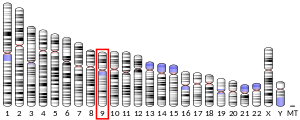Protein-coding gene in the species Homo sapiens
T-cell acute lymphocytic leukemia 2 , also known as TAL2 , is a protein which in humans is encoded by the TAL2 gene .[ 5] [ 6]
Function TAL2 is a member of the basic helix-loop-helix family of transcription factors .[ 7]
Clinical significance Tumor-specific alterations of the TAL2 gene occurs in some patients with T-cell acute lymphoblastic leukemia (T-ALL).[ 6] [ 8]
References
^ a b c GRCh38: Ensembl release 89: ENSG00000186051 – Ensembl , May 2017^ a b c GRCm38: Ensembl release 89: ENSMUSG00000028417 – Ensembl , May 2017^ "Human PubMed Reference:" . National Center for Biotechnology Information, U.S. National Library of Medicine .^ "Mouse PubMed Reference:" . National Center for Biotechnology Information, U.S. National Library of Medicine .^ "Entrez Gene: TAL2 T-cell acute lymphocytic leukemia 2" .^ a b Xia Y, Brown L, Yang CY, Tsan JT, Siciliano MJ, Espinosa R, Le Beau MM, Baer RJ (December 1991). "TAL2, a helix-loop-helix gene activated by the (7;9)(q34;q32) translocation in human T-cell leukemia" . Proc. Natl. Acad. Sci. U.S.A . 88 (24): 11416–20. Bibcode :1991PNAS...8811416X . doi :10.1073/pnas.88.24.11416 PMC 53146 PMID 1763056 . ^ Baer R (December 1993). "TAL1, TAL2 and LYL1: a family of basic helix-loop-helix proteins implicated in T cell acute leukaemia". Semin. Cancer Biol . 4 (6): 341–7. PMID 8142619 . ^ Marculescu R, Vanura K, Le T, Simon P, Jäger U, Nadel B (March 2003). "Distinct t(7;9)(q34;q32) breakpoints in healthy individuals and individuals with T-ALL". Nat. Genet . 33 (3): 342–4. doi :10.1038/ng1092 . PMID 12567187 . S2CID 20213008 .
Further reading
Gerhard DS, Wagner L, Feingold EA, et al. (2004). "The status, quality, and expansion of the NIH full-length cDNA project: the Mammalian Gene Collection (MGC)" . Genome Res . 14 (10B): 2121–7. doi :10.1101/gr.2596504 . PMC 528928 PMID 15489334 . Humphray SJ, Oliver K, Hunt AR, et al. (2004). "DNA sequence and analysis of human chromosome 9" . Nature . 429 (6990): 369–74. Bibcode :2004Natur.429..369H . doi :10.1038/nature02465 . PMC 2734081 PMID 15164053 . Marculescu R, Vanura K, Le T, et al. (2003). "Distinct t(7;9)(q34;q32) breakpoints in healthy individuals and individuals with T-ALL". Nat. Genet . 33 (3): 342–4. doi :10.1038/ng1092 . PMID 12567187 . S2CID 20213008 . Strausberg RL, Feingold EA, Grouse LH, et al. (2003). "Generation and initial analysis of more than 15,000 full-length human and mouse cDNA sequences" . Proc. Natl. Acad. Sci. U.S.A . 99 (26): 16899–903. Bibcode :2002PNAS...9916899M . doi :10.1073/pnas.242603899 PMC 139241 PMID 12477932 . Xia Y, Hwang LY, Cobb MH, Baer R (1994). "Products of the TAL2 oncogene in leukemic T cells: bHLH phosphoproteins with DNA-binding activity". Oncogene . 9 (5): 1437–46. PMID 8152805 . Wadman I, Li J, Bash RO, et al. (1994). "Specific in vivo association between the bHLH and LIM proteins implicated in human T cell leukemia" . EMBO J . 13 (20): 4831–9. doi :10.1002/j.1460-2075.1994.tb06809.x . PMC 395422 PMID 7957052 . Xia Y, Brown L, Yang CY, et al. (1992). "TAL2, a helix-loop-helix gene activated by the (7;9)(q34;q32) translocation in human T-cell leukemia" . Proc. Natl. Acad. Sci. U.S.A . 88 (24): 11416–20. Bibcode :1991PNAS...8811416X . doi :10.1073/pnas.88.24.11416 PMC 53146 PMID 1763056 . Goldfarb AN, Goueli S, Mickelson D, Greenberg JM (1992). "T-cell acute lymphoblastic leukemia--the associated gene SCL/tal codes for a 42-Kd nuclear phosphoprotein" . Blood . 80 (11): 2858–66. doi :10.1182/blood.V80.11.2858.bloodjournal80112858 PMID 1450410 .
(1) Basic domains
(1.1) Basic leucine zipper (bZIP )(1.2) Basic helix-loop-helix (bHLH )
Group A Group B Group CPAS Group D Group E Group F
(1.3) bHLH-ZIP (1.4) NF-1 (1.5) RF-X (1.6) Basic helix-span-helix (bHSH)
(2) Zinc finger DNA-binding domains
(2.1) Nuclear receptor (Cys4 )
subfamily 1 subfamily 2 subfamily 3 subfamily 4 subfamily 5 subfamily 6 subfamily 0
(2.2) Other Cys4 (2.3) Cys2 His2 (2.4) Cys6 (2.5) Alternating composition (2.6) WRKY
(4) β-Scaffold factors with minor groove contacts
(0) Other transcription factors




